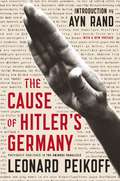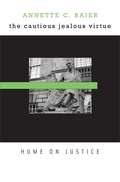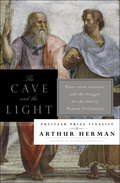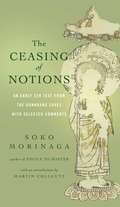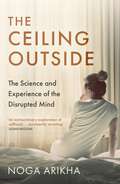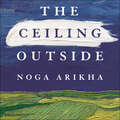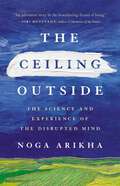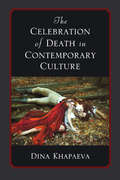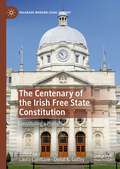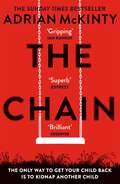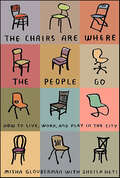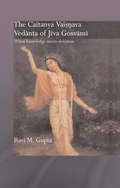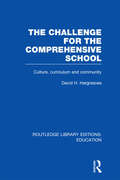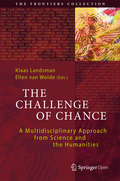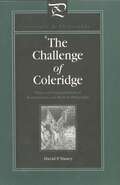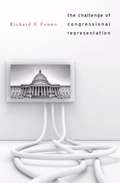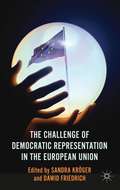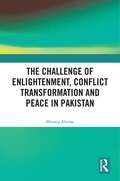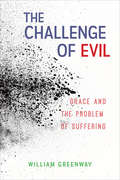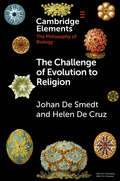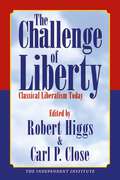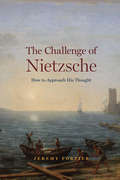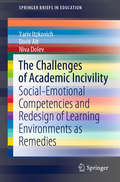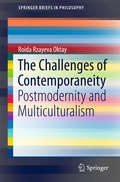- Table View
- List View
The Cause of Hitler's Germany
by Leonard Peikoff"A truly revolutionary idea.... Clear, tight, disciplined, beautifully structured, and brilliantly reasoned." --Ayn Rand Self-sacrifice, Oriental mysticism, racial "truth," the public good, doing one's duty--these are among the seductive catchphrases that circulated in pre-Nazi Germany. Objectivist author and philosopher Leonard Peikoff was Ayn Rand's long-time associate. In The Cause of Hitler's Germany--previously published in The Ominous Parallels--Peikoff demonstrates how unreason and collectivism led the seemingly civilized German society to become a Nazi regime.
The Cautious Jealous Virtue: Hume On Justice
by Annette BaierLike David Hume, whose work on justice she engages here, Annette C. Baier is a consummate essayist: her spirited, witty prose captures nuances and telling examples in order to elucidate important philosophical ideas. <p><p> Baier is also one of Hume's most sensitive and insightful readers. In The Cautious Jealous Virtue, she deepens our understanding of Hume by examining what he meant by “justice.” In Baier's account, Hume always understood justice to be closely linked to self-interest (hence his description of it in An Enquiry Concerning the Principles of Morals as “the cautious jealous virtue”), but his understanding of the virtue expanded over time, as evidenced by later works, including his History of England. <p> Along with justice, Baier investigates the role of the natural virtue of equity (which Hume always understood to constrain justice) in Hume's thought, arguing that Hume's view of equity can serve to balance his account of the artificial virtue of justice. The Cautious Jealous Virtue is an illuminating meditation that will interest not only Hume scholars but also those interested in the issues of justice and in ethics more generally.
The Cave and the Light: Plato Versus Aristotle, and the Struggle for the Soul of Western Civilization
by Arthur HermanArthur Herman has now written the definitive sequel to his New York Times bestseller, How the Scots Invented the Modern World, and extends the themes of the book--which sold half a million copies worldwide--back to the ancient Greeks and forward to the age of the Internet. The Cave and the Light is a magisterial account of how the two greatest thinkers of the ancient world, Plato and Aristotle, laid the foundations of Western culture--and how their rivalry shaped the essential features of our culture down to the present day. Plato came from a wealthy, connected Athenian family and lived a comfortable upper-class lifestyle until he met an odd little man named Socrates, who showed him a new world of ideas and ideals. Socrates taught Plato that a man must use reason to attain wisdom, and that the life of a lover of wisdom, a philosopher, was the pinnacle of achievement. Plato dedicated himself to living that ideal and went on to create a school, his famed Academy, to teach others the path to enlightenment through contemplation. However, the same Academy that spread Plato's teachings also fostered his greatest rival. Born to a family of Greek physicians, Aristotle had learned early on the value of observation and hands-on experience. Rather than rely on pure contemplation, he insisted that the truest path to knowledge is through empirical discovery and exploration of the world around us. Aristotle, Plato's most brilliant pupil, thus settled on a philosophy very different from his instructor's and launched a rivalry with profound effects on Western culture. The two men disagreed on the fundamental purpose of the philosophy. For Plato, the image of the cave summed up man's destined path, emerging from the darkness of material existence to the light of a higher and more spiritual truth. Aristotle thought otherwise. Instead of rising above mundane reality, he insisted, the philosopher's job is to explain how the real world works, and how we can find our place in it. Aristotle set up a school in Athens to rival Plato's Academy: the Lyceum. The competition that ensued between the two schools, and between Plato and Aristotle, set the world on an intellectual adventure that lasted through the Middle Ages and Renaissance and that still continues today. From Martin Luther (who named Aristotle the third great enemy of true religion, after the devil and the Pope) to Karl Marx (whose utopian views rival Plato's), heroes and villains of history have been inspired and incensed by these two master philosophers--but never outside their influence. Accessible, riveting, and eloquently written, The Cave and the Light provides a stunning new perspective on the Western world, certain to open eyes and stir debate.
The Ceasing of Notions
by Soko Morinaga Venerable Myokyo-Ni Martin Collcutt Michelle BromleyAmong the writings from the Dunhuang Caves, discovered in the mid-twentieth Century, are the Zen equivalent of the Dead Sea Scrolls--ancient texts unknown for centuries. The Ceasing of Notions is one such text. It takes a unique form: a dialogue between two imaginary figures, a master and his disciple, in which the disciple tenaciously pursues the master's pity utterances with follow-up questions that propel the dialogue toward ever more profound insights. And these questions prove to be the reader's very own. Soko Morinaga brings alive this compact and brilliant text with his own vivid commentary. This volume also includes a generous selection from Morinaga's acclaimed autobiography, Novice to Master: An Ongoing Lesson in the Extent of my Own Stupidity.
The Ceiling Outside: The Science and Experience of the Disrupted Mind
by Noga ArikhaAs her mother slips into the fog of dementia, a philosopher grapples with the unbreakable links between our bodies and our sense of self. Vanessa wakes from a coma having forgotten ten years of her life. Toussaint, is haunted by voices. Thomas no longer knows how to answer questions and Claire, a retired teacher loses the use of her right hand because of an inexplicable pain. Noga Arikha began studying these patients and their confounding symptoms in order to explore how our physical experiences inform our identities. Soon after she began her work, the question took on unexpected urgency, as Arikha's own mother began to show signs of Alzheimer's disease. Weaving together stories of her subjects' troubles and her mother's decline, Arikha searches for some meaning in the science she has set out to study. She explores how the self studies itself and how it loses itself, delving into the scientific research that can help us understand how deeply interconnected are our minds and bodies. The result is an unforgettable journey across the ever-shifting boundaries between ourselves and each other.
The Ceiling Outside: The Science and Experience of the Disrupted Mind
by Noga ArikhaAs her mother slips into the fog of dementia, a philosopher grapples with the unbreakable links between our bodies and our sense of self. Vanessa wakes from a coma to find she has lost ten years of memories and that she has become a person she does not recognise. Toussaint, a Haitian immigrant, is haunted by voices. Thomas no longer knows how to answer questions and a retired teacher loses the use of her right hand because of an inexplicable pain. Noga Arikha began studying these patients and their confounding symptoms in order to explore how our physical experiences inform our identities. Soon after she began her work, the question took on unexpected urgency, as Arikha's own mother began to show signs of Alzheimer's disease. Weaving together stories of her subjects' troubles and her mother's decline, Arikha searches for some meaning in the science she has set out to study. She explores how the self studies itself and how it loses itself, delving into the scientific research that can help us understand how deeply interconnected are our minds and bodies. The result is an unforgettable journey across the ever-shifting boundaries between ourselves and each other.(P) 2022 Hodder & Stoughton Limited
The Ceiling Outside: The Science and Experience of the Disrupted Mind
by Noga ArikhaAs her mother slips into the fog of dementia, a philosopher grapples with the unbreakable links between our bodies and our sense of self. A diabetic woman awakens from a coma having forgotten the last ten years of her life. A Haitian immigrant has nightmares that begin bleeding into his waking hours. A retired teacher loses the use of her right hand due to pain of no known origin. Noga Arikha began studying these patients and their confounding symptoms in order to explore how our physical experiences inform our identities. Soon after she initiated her work, the question took on unexpected urgency, as Arikha&’s own mother began to show signs of Alzheimer&’s disease. Weaving together stories of her subjects&’ troubles and her mother&’s decline, Arikha searches for some meaning in the science she has set out to study. The result is an unforgettable journey across the ever-shifting boundaries between ourselves and each other.
The Celebration of Death in Contemporary Culture
by Dina KhapaevaThe Celebration of Death in Contemporary Culture investigates the emergence and meaning of the cult of death. Over the last three decades, Halloween has grown to rival Christmas in its popularity. Dark tourism has emerged as a rapidly expanding industry. “Corpse chic” and “skull style” have entered mainstream fashion, while elements of gothic, horror, torture porn, and slasher movies have streamed into more conventional genres. Monsters have become pop culture heroes: vampires, zombies, and serial killers now appeal broadly to audiences of all ages. This book breaks new ground by viewing these phenomena as aspects of a single movement and documenting its development in contemporary Western culture. This book links the mounting demand for images of violent death with dramatic changes in death-related social rituals. It offers a conceptual framework that connects observations of fictional worlds—including The Twilight Saga, The Vampire Diaries, and the Harry Potter series—with real-world sociocultural practices, analyzing the aesthetic, intellectual, and historical underpinnings of the cult of death. It also places the celebration of death in the context of a longstanding critique of humanism and investigates the role played by 20th-century French theory, posthumanism, transhumanism, and the animal rights movement in shaping the current antihumanist atmosphere. This timely, thought-provoking book will appeal to scholars of culture, film, literature, anthropology, and American and Russian studies, as well as general readers seeking to understand a defining phenomenon of our age.
The Cement of Civil Society
by Diani MarioCivil society is frequently conceived as a field of multiple organizations, committed to highly diverse causes and interests. When studied empirically, however, its properties are often reduced to the sum of the traits and attitudes of the individuals or groups that are populating it. This book shows how to move from an 'aggregative' to a relational view of civil society. Drawing upon field work on citizens' organizations in two British cities, this book combines network analysis and social movement theories to show how to represent civil society as a system of relations between multiple actors. 'Modes of coordination' enables us to identify different logics of collective action within the same local settings. The book exposes the weakness of rigid dichotomies, separating the voluntary sector from social movements, 'civic' activism oriented to service delivery from 'un-civic' protest, grassroots activism external to institutions from formal, professionalized organizations integrated within the 'system'.
The Centenary of the Irish Free State Constitution: Constituting a Polity? (Palgrave Modern Legal History)
by Laura Cahillane Donal K. CoffeyThis book deals with the role, development, and legacy of the first Constitution of independent Ireland within the wider context of the establishment of the State. After decades of relative neglect, the 1920s have been receiving increased attention from historians recently thanks to the centenary of the State’s foundation. This book continues this trend of re-examination of this period and looks at key themes, such as the establishment of institutions under the Irish Free State Constitution and the focus on the ideals of popular sovereignty and democracy. It does so from novel and cross-disciplinary perspectives, and it also looks at areas which have received little to no previous attention; from individual aspects like property rights, the Irish language and environmental rights to aspects such as opposition and partition.
The Chain: The Award-Winning Suspense Thriller of the Year
by Adrian McKintyTHE ONLY WAY TO GET YOUR CHILD BACK IS TO KIDNAP ANOTHER CHILD'A blazing, full-tilt thriller that entirely justifies the hype' GUARDIAN'A heart-stopping roller coaster' DAILY MAIL* * * * *YOUR PHONE RINGS.A STRANGER HAS KIDNAPPED YOUR CHILD.TO FREE THEM YOU MUST ABDUCT SOMEONE ELSE'S CHILD.YOUR CHILD WILL BE RELEASED WHEN YOUR VICTIM'S PARENTS KIDNAP ANOTHER CHILD.IF ANY OF THESE THINGS DON'T HAPPEN:YOUR CHILD WILL BE KILLED.VICTIM. SURVIVOR. ABDUCTOR. CRIMINAL.YOU WILL BECOME EACH ONE. YOU ARE NOW PART OF THE CHAIN * * * * *THE MULTI-AWARD-WINNING THRILLERWinner: Theakstons Old Peculier Crime Novel of the YearWinner: Ned Kelly Award for Best International Crime Fiction Winner: International Thriller Writers Awards - Best Hardcover Winner: Macavity Awards - Best International Crime Fiction Winner: Barry Award - Thriller of the Year*****'A heart-stopping roller coaster'DAILY MAIL'The book everyone is talking about'MIRROR'Scary, plausible, gripping.'IAN RANKIN'You'll miss meals, sleep, and your stop on the bus - guaranteed.'VAL McDERMID'I writhed with the pain of withdrawal when I finished it. Deserves to be the popular hit of the year.'DAILY TELEGRAPH'Incredibly propulsive and original. You won't shake it for a long time.'STEPHEN KING'A masterpiece. You will never be able to forget it.'DON WINSLOW'A unique and unforgettable thriller. Breath-taking, breakneck, brilliant.'MARK BILLINGHAM'Striking, memorable, should be savoured.'TANA FRENCH'Explosively brilliant. Genuinely unputdownable. Terribly plausible'OBSERVER'I may not read a better thriller in my lifetime.'STEVE CAVANAGH 'An electrifying thriller - one of the very best of its kind'FIONA CUMMINS'What a fantastic idea and perfectly written. I'm quite jealous.'ANTHONY HOROWITZ'Terrifying. Terrific.'MICK HERRON'THE CHAIN does for parenting what Gone Girl did for marriage. A must-read thriller.'JAMES SWALLOW'Diabolical, unnerving, relentless.'DENNIS LEHANE'Utterly brilliant'ELLY GRIFFITHSA 'THRILLER OF THE YEAR' SELECTION FOR:GUARDIANDAILY TELEGRAPHAMAZONEXPRESSOBSERVERTIME MAGAZINE
The Chairs Are Where the People Go: How to Live, Work, and Play in the City
by Sheila Heti Misha GloubermanShould neighborhoods change? Is wearing a suit a good way to quit smoking? Why do people think that if you do one thing, you're against something else? Is monogamy a trick? Why isn't making the city more fun for you and your friends a super-noble political goal? Why does a computer last only three years? How often should you see your parents? How should we behave at parties? Is marriage getting easier? What can spam tell us about the world? Misha Glouberman's friend and collaborator, Sheila Heti, wanted her next book to be a compilation of everything Misha knew. Together, they made a list of subjects. As Misha talked, Sheila typed. He talked about games, relationships, cities, negotiation, improvisation, Casablanca, conferences, and making friends. His subjects ranged from the sublime to the ridiculous. But sometimes what had seemed trivial began to seem important—and what had seemed important began to seem less so. The Chairs Are Where the People Go is refreshing, appealing, and kind of profound. It's a self-help book for people who don't feel they need help, and a how-to book that urges you to do things you don't really need to do.
The Chaitanya Vaishnava Vedanta of Jiva Gosvami: When Knowledge Meets Devotion (Routledge Hindu Studies Series)
by Ravi M. GuptaThe Chaitanya Vaishnava tradition is famous for its depth of devotion to Krishna, the blue-hued Deity. Chaitanya Vaishnavas are known for having refined the practice and aesthetics of devotion into a sophisticated science. This imposing devotional edifice was constructed upon a solid foundation of philosophical argument and understanding. In this book, Ravi Gupta sheds new light on the contribution of Chaitanya Vaishnavism to the realm of Indian philosophy. He explores the hermeneutical tools employed, the historical resources harnessed, the structure of the arguments made, and the relative success of the endeavor. For most schools of Vaishnavism, the supporting foundation consists of the philosophical resources provided by Vedanta. The Chaitanya tradition is remarkable in its ability to engage in Vedantic discourse and at the same time practice an ecstatic form of devotion to Krishna. The prime architect of this balance was the scholar-devotee Jiva Gosvami (ca. 1517 - 1608). This book analyses Jiva Gosvami's writing concerning the philosophy of the Vedanta tradition. It concludes that Jiva's writing crosses 'disciplinary boundaries', for he brought into dialogue four powerful streams of classical Hinduism: the various systems of Vedanta, the ecstatic bhakti movements, the Puranic commentarial tradition, and the aesthetic rasa theory of Sanskrit poetics. With training in and commitments to all of these traditions, Jiva Gosvami produced a distinctly Chaitanya Vaishnava system of theology.
The Challenge For the Comprehensive School: Culture, Curriculum and Community (Routledge Library Editions: Education)
by David HargreavesBy 1982 the ambitious claims made for newly established comprehensive schools were being put to the test. How effectively does the comprehensive meet the needs of all young people? Do urban, working-class students enjoy more success than in the secondary modern schools? Are they more engaged in their learning with higher self-esteem? This volume discusses these questions and examines issues of social mobility and cohesion, curriculum, the balance between academic and vocational education, the place of exams in the educational system and the influence of independent schools. The author asks whether a more decentralised system of self-governing schools improve the education service – a timely question which along with the other issues examined is as relevant and challenging today as when the book was originally published in 1982.
The Challenge of Chance: A Multidisciplinary Approach from Science and the Humanities (The Frontiers Collection)
by Klaas Landsman Ellen WoldeThis book presents a multidisciplinary perspective on chance, with contributions from distinguished researchers in the areas of biology, cognitive neuroscience, economics, genetics, general history, law, linguistics, logic, mathematical physics, statistics, theology and philosophy. The individual chapters are bound together by a general introduction followed by an opening chapter that surveys 2500 years of linguistic, philosophical, and scientific reflections on chance, coincidence, fortune, randomness, luck and related concepts. A main conclusion that can be drawn is that, even after all this time, we still cannot be sure whether chance is a truly fundamental and irreducible phenomenon, in that certain events are simply uncaused and could have been otherwise, or whether it is always simply a reflection of our ignorance. Other challenges that emerge from this book include a better understanding of the contextuality and perspectival character of chance (including its scale-dependence), and the curious fact that, throughout history (including contemporary science), chance has been used both as an explanation and as a hallmark of the absence of explanation. As such, this book challenges the reader to think about chance in a new way and to come to grips with this endlessly fascinating phenomenon.
The Challenge of Coleridge: Ethics and Interpretation in Romanticism and Modern Philosophy (Literature and Philosophy)
by David HaneyInterweaving past and present texts, The Challenge of Coleridge engages the British Romantic poet, critic, and philosopher Samuel Taylor Coleridge in a "conversation" (in Hans-Georg Gadamer’s sense) with philosophical thinkers today who share his interest in the relationship of interpretation to ethics and whose ideas can be both illuminated and challenged by Coleridge’s insights into and struggles with this relationship.In his philosophy, poetry, theology, and personal life, Coleridge revealed his concern with this issue, as it manifests itself in the relation between technical and ethical discourse, between fact and value, between self and other, and in the ethical function of aesthetic experience and the role of love in interpretation and ethical action.Relying on Gadamer’s hermeneutics to supply a framework for his approach, Haney connects Coleridge’s ideas with, among others, Emmanuel Levinas’s other-oriented notion of ethical subjectivity, Paul Ricoeur’s view about the other’s implication in the self, reinterpretations of Greek drama by Bernard Williams and Martha Nussbaum, and Gianni Vattimo's post-Nietzschean hermeneutics.Coleridge is treated not as a product of Romantic ideology to be deconstructed from a modern perspective, but as a writer who offers a "challenge" to our modern tendency to compartmentalize interpretive issues as a concern for literary theorists and ethical issues as a concern for philosophers. Looking at the two together, Haney shows through his reading of Coleridge, can enrich our understanding of both.
The Challenge of Congressional Representation
by Richard F. FennoAt a moment when Congress is viewed by a skeptical public as hyper-partisan and dysfunctional, Richard Fenno provides a variegated picture of American representational politics. The Challenge of Congressional Representation offers an up-close-and-personal look at the complex relationship between members of Congress and their constituents back home.
The Challenge of Democratic Representation in the European Union
by Sandra Kröger Dawid FriedrichWhat does political representation in the European Union look like? This volume argues that the transformation of representation in the EU is characterized by diversification processes, albeit with an uncertain ability to re-configure the link between representation and democracy.
The Challenge of Enlightenment, Conflict Transformation and Peace in Pakistan
by Moonis AhmarThis book looks at the process of cultural enlightenment in the context of Pakistan. It undertakes an interesting and in-depth research focusing on how the world’s second largest Muslim state can learn from Europe’s heritage of enlightenment. It studies why Pakistan lacks a process of awakening and what the scope of cultural enlightenment in Pakistan is against the backdrop of militant Islam. The author argues that cultural enlightenment can help promote positive conflict transformation in Pakistan and discusses the ways in which challenges to establishing a culture of reasoning, tolerance, accommodation, social justice and peace can be dealt with. A unique contribution, this book will be of interest to students and researchers of philosophy, political science, history, international relations, South Asian studies and religious studies. It will also appeal to think tanks, policymakers and general readers interested in these topics.
The Challenge of Evil: Grace And The Problem Of Suffering
by William GreenwayBelief in God in the face of suffering is one of the most intractable problems of Christian theology. Many respond to the spiritual challenge of evil by ignoring it, blaming God, or insisting on the inherent meaninglessness of life. In this book, William Greenway contends that we don't have to deny our moral selves by either ignoring evil or abandoning our moral sensibilities toward it. We can open our eyes fully to suffering and evil, and our own complicity in them. We can do so because it is only in this full acceptance of the world's guilt and our own that we make ourselves fully open to agape, to being seized by love of others and God. Inspired by the Jewish philosopher Emmanuel Levinas and the Christian novelist Fyodor Dostoyevsky, The Challenge of Evil lovingly explains how we can look squarely at the overwhelming suffering in the world and still, by grace, have faith in a good and loving God.
The Challenge of Evolution to Religion (Elements in the Philosophy of Biology)
by Johan De Smedt Helen De CruzThis Element focuses on three challenges of evolution to religion: teleology, human origins, and the evolution of religion itself. First, religious worldviews tend to presuppose a teleological understanding of the origins of living things, but scientists mostly understand evolution as non-teleological. Second, religious and scientific accounts of human origins do not align in a straightforward sense. Third, evolutionary explanations of religion, including religious beliefs and practices, may cast doubt on their justification. We show how these tensions arise and offer potential responses for religion. Individual religions can meet these challenges, if some of their metaphysical assumptions are adapted or abandoned.
The Challenge of Liberty: Classical Liberalism Today
by Robert HiggsIs Classical Liberalism Still Vital?The quest for freedom has always been as much a battle of ideas as it is a popular struggle. Classical liberal pioneers such as John Locke and Adam Smith stressed the inherent worth of the individual, inalienable rights, and the benevolent consequences of the cooperative, peaceful pursuit of one&’s own happiness. These ideas became the intellectual scaffolding for much of the West&’s most fundamental institutions and achievements. Yet after its 19th-century high-water mark, classical liberalism lost much of its passion, focus, and popular support. Intellectual trends increasingly began to support coercive egalitarianism, empire, and central planning at the expense of individual liberty, personal responsibility, private property, natural law, and free institutions. But the eclipse of classical liberalism by contemporary liberalism and conservatism is passing. The Challenge of Liberty restores the ideas and ideals of classical liberalism and shows how its contemporary exponents defend such pillars of free societies as individual rights, human dignity, market processes, and the rule of law.
The Challenge of Nietzsche: How to Approach His Thought
by Jeremy FortierFriedrich Nietzsche is one of the most widely read authors in the world, from the time of his death to the present—as well as one of the most controversial. He has been celebrated as a theorist of individual creativity and self-care but also condemned as an advocate of antimodern politics and hierarchical communalism. Rather than treating these approaches as mutually exclusive, Jeremy Fortier contends that we ought instead to understand Nietzsche’s complex legacy as the consequence of a self-conscious and artful tension woven into the fabric of his books.The Challenge of Nietzsche uses Nietzsche as a guide to Nietzsche, highlighting the fact that Nietzsche equipped his writings with retrospective self-commentaries and an autobiographical apparatus that clarify how he understood his development as an author, thinker, and human being. Fortier shows that Nietzsche used his writings to establish two major character types, the Free Spirit and Zarathustra, who represent two different approaches to the conduct and understanding of life: one that strives to be as independent and critical of the world as possible, and one that engages with, cares for, and aims to change the world. Nietzsche developed these characters at different moments of his life, in order to confront from contrasting perspectives such elemental experiences as the drive to independence, the feeling of love, and the assessment of one’s overall health or well-being. Understanding the tension between the Free Spirit and Zarathustra takes readers to the heart of what Nietzsche identified as the tensions central to his life, and to all human life.
The Challenges of Academic Incivility: Social-Emotional Competencies and Redesign of Learning Environments as Remedies (SpringerBriefs in Education)
by Yariv Itzkovich Dorit Alt Niva DolevThe book introduces readers with theory and empirical findings related to uncivil behaviour in academic settings and discusses its precursors, implications and remedies. In the first part, we define academic incivility, its manifestations and dimensions, while distinguishing between academic incivility and workplace incivility. We then discuss the prevalence of faculty incivility (FI) and students’ incivility (SI) in academic settings and focus on the dyadic relationships between faculty and students in the broader context of incivility in academia, with an added focus on faculty incivility.The second part introduces the main contributors to academic incivility. Personal factors, in this case, social-emotional competencies, and contextual factors, in this case, learning environments, are explored by combining up-to-date research data, personal stories and interviews with lecturers and students. A deep understanding of the precursors of academic incivility is critical to the examination of possible coping strategies within academic settings and elsewhere.In the third part, we explore the potential and practical remedies that can mitigate incivility in academic settings and, in particular, the enhancement of emotional and social competencies and the modification of learning environments.
The Challenges of Contemporaneity
by Roida Rzayeva OktayThis book presents an overview of postmodernism and its social indicators, and of the postmodern condition in consciousness as an indicator of its modification and development. The book brings together philosophical, sociological and cultural approaches towards contemporary societal issues, such as multiculturalism, culture of dialogue, philosophy of dialogue, tolerance, and gender. In doing so, it suggests a framing approach to cross-disciplinary research. The book also discusses various forms of multiculturalism, including multiculturalism as multiple modernities and plural modernities, and non-Western contemporaneity. It explores the background of the dynamics of the development of public consciousness, in particular from the modern to postmodern, and subsequently examines the West/non-West dichotomy and how that dichotomy is currently being reconsidered in response to the intellectual-spiritual realities of modern life.
